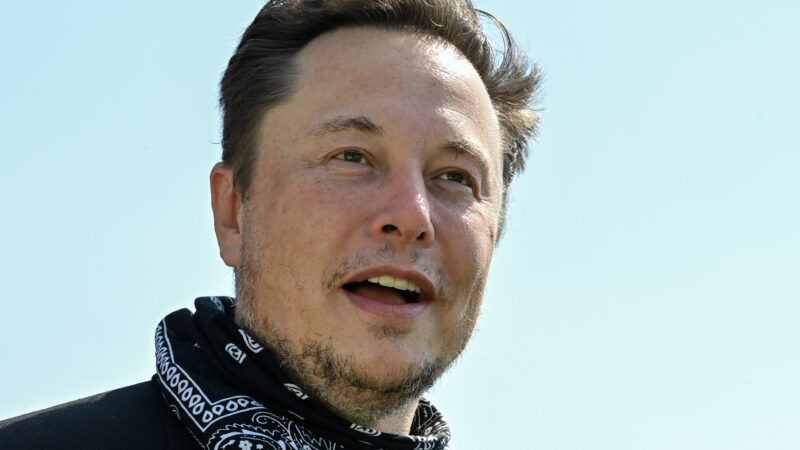風蕭蕭_Frank
以文會友Elon Musk: Government Is 'the Biggest Corporation, With a Monopoly on Violence, Where You Have No Recourse'
Musk's finally ready to admit that government subsidies distort markets and that government actors are terrible at capital allocation.

"Say tomorrow, you get a phone call from Joe Biden," asked Wall Street Journal tech columnist Joanna Stern to Tesla CEO Elon Musk in a Monday night forum. "And he asks: What are your needs from this [$2 trillion spending] bill? How do you answer him?"
"We don't think about it at all, really," Musk said, channeling Don Draper to the tune of the audience's uneasy laughter. "It might be better if the bill doesn't pass," Musk added. "The federal budget deficit is insane…something's gotta give, you can't just spend $3 trillion more than you own every year and don't expect something bad to happen."
"With this bill, there is a lot of support for E.V.s [electric vehicles]…and it helps Tesla," Stern told Musk. So if the bill shouldn't pass, Stern asked, "what do you think the role of government should be?"
"I think the role of the government should be that of a referee, but not a player on the field," replied Musk. "Government should try to get out of the way and not impede progress." He continued:
The rules and regulations keep increasing every year. Rules and regulations are immortal, they don't die. Occasionally you see some law with a sunset provision, but really, otherwise, the vast majority of rules and regulations live forever….Eventually it just takes longer and longer and it's harder to do things. There's not really an effective garbage collection system for removing rules and regulations. And so gradually this hardens the arteries of civilization, where you're able to do less and less over time. So I think government should be trying really hard to get rid of rules and regulations that perhaps had merit at some time but don't have merit currently."
"Honestly, I would just can this whole bill. Don't pass it," Musk said forcefully.
The Build Back Better bill, which legislators in Congress are hoping to cram through this month or next, would include $12,500 tax credits for U.S.-made electric vehicles made in unionized factories, up from the $7,500 currently offered. Critics note that Musk has no reason to support the E.V. provision because Tesla factories are not unionized. But there are other good reasons for him to oppose these provisions: E.V. adoption and the creation of charging stations are plugging along just fine as is, no (market-distorting, union-favoring) government intervention needed—a point specifically made by Musk, who noted that the federal government does not pay for gas stations and does not need to build E.V. charging stations. "I'm literally saying get rid of all subsidies," clarified Musk. (It's worth noting that the charging station subsidies were included in the infrastructure bill passed last month, so the details of the two eye poppingly pricey bills are getting somewhat conflated.)
It's nice to hear Musk denouncing government intervention, but he has unquestionably benefited handsomely from government subsidies in the past, so this looks a bit like he's pulling the ladder up behind him to stymie encroaching competitors.
Musk is "the model businessman in the age of Obama," wrote The Washington Examiner's Tim Carney several years ago. "His businesses thrive on mandates, regulations, and subsidies. Tesla received a federal loan guarantee to make its plug-in cars, which are also subsidized through tax credits for buyers. SolarCity's suppliers are subsidized solar panel makers, and its customers get tax credits for getting the panels installed. SpaceX is largely a government contractor."
"Tesla Motors Inc., SolarCity Corp. and Space Exploration Technologies Corp., known as SpaceX, together have benefited from an estimated $4.9 billion in government support," according to a 2015 Los Angeles Times' investigation. "Musk and his companies' investors enjoy most of the financial upside of the government support, while taxpayers shoulder the cost." And, more recently, both SpaceX and Amazon's Project Kuiper have publicly jousted, siccing the Federal Communications Commission on the other, all while suckling at the government teat to get millions in subsidies for satellite internet projects.
Still, Musk's own suspect motivations for ending these subsidies don't make the substance of his comments less true. When taken with his other government-skeptical statements—"it does not make sense to take the job of capital allocation away from people with a demonstrated great skill in capital allocation and give it to an entity that has demonstrated very poor skill in capital allocation"—it seems like Musk may have unseated free speech–loving warlock Jack Dorsey as America's richest, staunchest government skeptic.
After all, "the government is simply the biggest corporation, with a monopoly on violence and where you have no recourse," said Musk, when asked if billionaires like him should have their wealth seized via taxation and redistributed by the federal government. Where's the lie?




